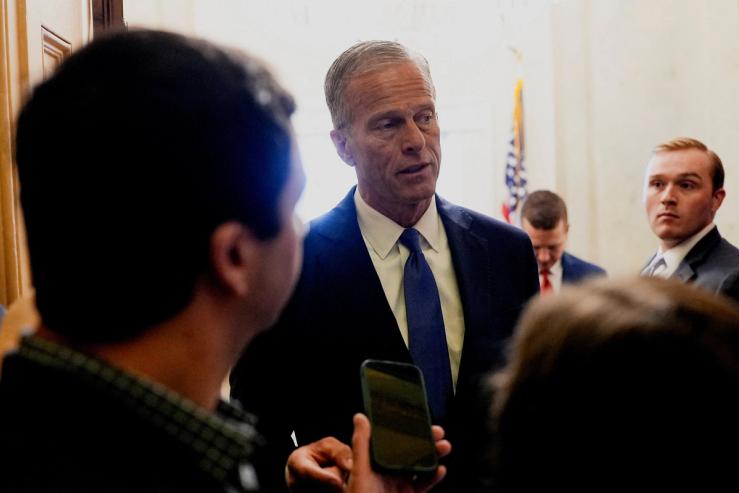The Scoop
Senate Majority Leader John Thune told Semafor that GOP leaders are considering whether to offer Democrats a future vote on extending health care subsidies as a bid to end the deadlock on the government shutdown.
Thune said that “if there are 8 or 10 Democrats that vote to open up” in exchange for a vote on the expiring Affordable Care Act subsidies, “that might be an off-ramp” to reopen the government. Senate Majority Whip John Barrasso, R-Wyo., said that senators “are in discussions” about making the offer for such a vote.
Republicans remain adamant that any action on, and the details of, reviving the subsidies would have to wait until the government reopens. And just as importantly, they are declining to guarantee that they would be able to provide the support needed for any vote on the subsidies to pass — which would require buy-in from the House and President Donald Trump.
“We need to open the government, and then we can have all the discussions and votes and talks and all of those things,” Barrasso said.
One Senate Democrat said that if Thune could guarantee a vote on both the ACA subsidies and bipartisan appropriations bills, it might be enough to switch some Democrats from no to yes on the House-passed spending bill. Republicans currently need five more Democrats to vote with them to reopen the government, if recent Senate vote counts hold.
Still, other Democrats say they might need to fund the government for a shorter timetable than the House did in its seven-week stopgap bill, given that health insurance marketplaces open in November. Passing a shorter stopgap would require the House to come back to DC, which Speaker Mike Johnson has declined to do during the shutdown.
“The short-term CR that I’m willing to vote for is something that is a couple days before Nov. 1,” said Sen. Ruben Gallego, D-Ariz. “So that way, we have time to actually work on a real bill with ACA extensions. And if they don’t give us the ACA extensions, then we could go back to the same position, go back to shutting down again.”
Even the Republicans who are most amenable to a deal on health insurance costs say they can’t promise a new law by the end of the month; for anything to pass, the GOP is likely to insist on new restrictions for high-income Americans getting the ACA subsidies.
Sen. Susan Collins, R-Maine, said it’s “possible” for there to be a quick negotiation but an income cap needs to be part of it.
“What they’re asking for is a guaranteed outcome with the president and with the House of Representatives,” Sen. Mike Rounds, R-S.D., told Semafor. “And what we’re trying to do is to retain our integrity by not making a promise that we can’t keep.”
The government shutdown still looks likely to stretch into next week, as Democrats again blocked a government funding bill Thursday to maintain their leverage in the talks.
Yet it’s clear that Senate Democrats and Republicans alike are gently kicking the tires on a potential agreement to continue tax credits initially envisioned as a temporary, pandemic-related measure to help keep premiums down for millions of Americans.
Sen. Jon Ossoff, D-Ga., said Republicans’ discussions may indicate “that they are beginning to realize that the American people want to prevent massive increases in health insurance premiums.”
In this article:
Know More
Getting a durable deal through the Senate would be easier than the House — and even the upper chamber will be difficult. Democrats would have to trust Republicans enough to vote to open the government. Then both parties would have to engage in a negotiation that could get 60 votes within days, given that the ACA marketplaces open in November.
“It would have to come with stiff penalties for false claims and things of that nature. And the subsidies may not be at the level that they are now. But I think all of that’s on the table, and I do think that some people would support it,” one Senate Republican told Semafor.
“We would have to have the president on board. We would have to have some assurances from Speaker Johnson.”
To get the House to pass any future health care subsidies deal, the Republican added, the Senate would need to put up well over 60 votes.
That’s another high hurdle, because the ACA credits split Republicans painfully.
“I do hear some [in the GOP] that are really concerned about these rates going up. I mean, I would think they would be incredibly motivated to try to fix this,” said Sen. Mark Kelly, D-Ariz., who is involved in bipartisan discussions but said Senate talks can only go so far. “The House has to come back before they can do anything.”
Perhaps the only glimmer of hope on the House side is a bipartisan proposal that would extend the ACA subsidies for a year. That could solve the most immediate problem but would also set up another similar cliff for next year.
Rep. Mike Lawler, R-N.Y., who supports that legislation, said it’s “got a more realistic prospect of passing than what [Democrats are] proposing,” which includes a permanent extension of the subsidies.
Room for Disagreement
Several Republicans interviewed by Semafor said they wouldn’t rule out keeping some form of the subsidies intact, but not without a full conversation about the Affordable Care Act — after the government reopens.
Sen. Bernie Moreno, R-Ohio, said “we need to have a whole health care conversation like adults.”
“It has to be a broader conversation than this,” echoed Sen. Jon Husted, R-Ohio, who is up for reelection against one of Democrats’ top recruits next year.
“I understand the situation when you create a pandemic-era program. People later become dependent on it. Then it goes away quickly. Then, they experience difficulty.”
Burgess’s view
The brief 2018 shutdown ended with a promise for a future vote on immigration. Those votes failed, and Democrats would probably need some more reassurance that the House and White House are serious about the health care credits before voting to fund the government for seven weeks.
Republicans are absolutely adamant that they will not negotiate with Democrats directly on the funding bill because they view it as a bad precedent to set, opening them up to a similar dynamic every time there’s a shutdown deadline.
Plus, Democrats didn’t budge in past shutdowns on including Republican priorities in their funding bills.
Republicans probably would argue a promised vote is as good as it gets under the current dynamics, even though Democrats clearly want more.
That’s because Republicans’ opposition to attaching any health care credits extension to a must-pass funding bill fundamentally limits their ability to offer much else.
Notable
- House Republicans, meanwhile, are criticizing remarks by Senate Minority Leader Chuck Schumer, per Punchbowl.
Eleanor Mueller contributed.


